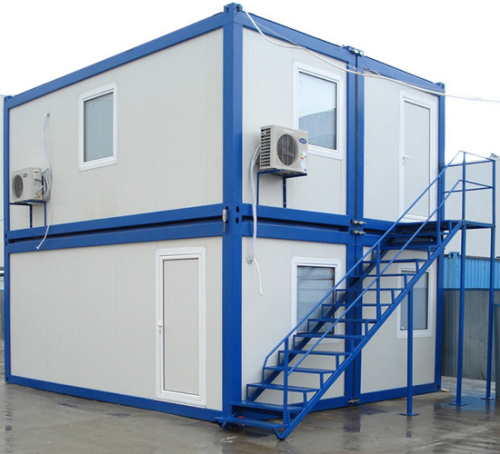
Professionals in the construction industry are familiar with the term project office. But it gets confusing when business media frequently mentions the term project management office (PMO). So what is a project office and how is it different from a PMO? This article explains what each is and explores the similarities and differences.
Table of contents
- What is a project office?
- Purposes of a project office
- What is a project management office (PMO)?
- Responsibilities of a PMO
- Similarities and differences
- Interactions between a project office and the PMO
What is a project office?
A project office is typically a trailer or other short-term facility that a company uses as an office for a project. Companies build or set up a project office whenever they need office facilities near a long-term but temporary project site. Construction projects, such as building a housing tract, an office building, or a bridge, often use these offices.

Companies use these offices to house the project manager, the site foreman, and other office workers needed on site. Secretaries, receivers, inventory management staff, and accounting staff also work in project offices.
Read also: Overcoming Hard Truths About Construction Project Management
Purposes of a project office
A project office is responsible for a large, single project for the duration of the project only. There are at lease three possible purposes of a project office:
Sales office
The first purpose is as a sales office. This facility generally contains a number of pictures, models, and drawings. The marketing materials allow the salespeople to sell construction or building units.
Off-site project office
Another purpose is to be the off-site project office. A company sets up an off-site project office when the on-site project office is not convenient or appropriate for the majority of the required office staff. So, the company houses the staff in a facility usually within an office building. This is common for companies that run multiple projects involving estimators, accountants, and other support staff. In effect, companies can have multiple project offices. They use an on-site for the site manager and other staff needed on site, and an off-site office for the rest of the staff.
War room
A third purpose is to be a war room. It is a meeting space allocated for the project. The project manager uses it as an office, but its main function is to display project documents. It also serves as the archive space for the project documents. Both the off-site project office and the war room describe the fresher definitions of a project office.
What is a project management office (PMO)?
A project management office is a permanent department or business unit within a company. It is at an organizational level where it is responsible for specific departments. The PMO provides oversight, coordination, and management of multiple projects that the company starts and executes. When one project ends, it shifts its attention to new or other ongoing projects.

Responsibilities of a PMO
The project management office is the department in charge of establishing a governance framework, providing management reports, and identifying priority projects. Companies set up and open PMOs as they seek more efficiency and tighter monitoring of their projects.
Establish a governance framework
The PMO is responsible for establishing a project governance framework so a company can have a structured approach. It identifies the various stakeholders such as the project sponsor, client, users, project managers, and team members. The PMO also defines the role and respective responsibilities of the stakeholders, including their authority and capacity to make decisions for the project.
Provide management reports
The PMO centralizes project information to deliver the right information to the right stakeholders. These reports allow management to make informed and timely decisions to keep the project on track toward success. Some of the reports that the PMO provides are the overall progress and health of projects, status of milestones and deliverables, financial information about project budget, and project risks and their mitigation.
Prioritize projects, programs, and portfolios
Companies set up strategies to achieve business goals. These strategies consist of projects, programs, and portfolios, which are the means to achieve business goals. The PMO is responsible for ensuring that the projects selected and prioritized will help the company achieve its goals. It also prioritizes and manages programs and portfolios so that they align with business strategy and goals.
Other PMO responsibilities include:
- Efficient resource planning and scheduling
- Resource capacity planning and forecasting
- Process and workflow streamlining and automation
- Project learning and knowledge accessibility
- Project manager and team training and mentoring
Read also: Goals of an Enterprise Project Management Office
Similarities and differences
In some organizations, project office refers to the staff instead of the facility who support the project, such as the project manager, project accountants, estimators, and secretarial staff. However, a project office limits itself to a single project and tasks for that project such as documentation, reporting, metrics, or data analysis.
On the other hand, a project management office is always an organizational group and never a facility. Senior project managers and other experienced project professionals usually comprise the PMO. The seniority and experience are vital to their responsibility, foremost of which is quality management of projects. Constantly assessing and taking past experiences into account, the PMO ensures quality of a project with the primary goal of improving project performance.
Interactions between the project office and the PMO
A project office and the project management office can both be present in a company at any time a project is ongoing. The main responsibilities differ as the PMO looks at all projects in all their phases, while the project office focuses on a single specific project especially at the execution and delivery phase. As the central coordinator, the PMO is responsible for providing the staff for the project office.
*Glen Ford is an accomplished project management consultant, trainer, and writer. He has over 20 years experience as a project manager in such diverse projects as Construction, IT, Software Development, Marketing and Business Startup. He is a serial entrepreneur who quite literally learned to be an entrepreneur at his great-grandfather’s knee.





